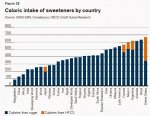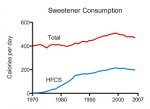wow, That's pretty high
"
The past couple of runs, I've been listening to Kelly Brownell of the Rudd Center for Food Policy and Obesity at Yale interview Dr. Robert Lustig of the University of California at San Francisco. (Part 1, "Childhood Obesity"| Part 2, "Sugar and Processed Food") Yesterday, I was bowled over — OK, just figuratively, I did actually keep running — by Lustig's saying that 80 percent of the 600,000 food product sold have added sugar.
*I* am convinced that added sugar is pervasive, but I never would have guessed it was thus. (I inquired about the stat, first with Lustig and then with UNC's Barry Popkin, whom Lustig pointed to as his source. The final figure was more like 74 percent, Popkin said, and will be published in the next month or two.)
In the same 'cast, Lustig said that we need to drastically reduce average daily consumption of sugar — from 22 teaspoons now to 9 teaspoons for men and to 6 teaspoons for women — if we are to avoid the illnesses that otherwise result, and "there's no way to do it with the current food supply."
74 percent of food products have added sugar | Michael Prager
eace


